Heath Ledger remains a towering figure in the landscape of contemporary cinema, known not only for his magnetic screen presence but also for his profound ability to inhabit and bring to life a diverse array of characters. His career, though tragically brief, left an indelible mark on Hollywood and on audiences around the world.
In this article, we delve deep into the top 10 movies of Heath Ledger, exploring not just the films themselves but the intricate layers of performance, thematic elements, and cultural impact each one contributed to the cinematic world. Through an in-depth analysis of these select works, we’ll trace the evolution of Ledger as an actor, highlighting his remarkable range and versatility and ultimately reflecting on his lasting legacy in the film industry.
1. “Brokeback Mountain” (2005)
“Brokeback Mountain” (2005), directed by Ang Lee, is not merely a film; it is a profound exploration of love, loss, and the indomitable spirit of human emotions, set against the backdrop of the sweeping landscapes of Wyoming.
At the heart of this cinematic masterpiece are two cowboys, Ennis Del Mar (Heath Ledger) and Jack Twist (Jake Gyllenhaal), whose summer romance evolves into a complex, clandestine relationship spanning decades. Heath Ledger’s portrayal of Ennis Del Mar is nothing short of spectacular, offering a deeply nuanced and emotionally rich performance that has left an indelible mark on the annals of film history.
Plot and Character Development: The narrative of “Brokeback Mountain” is a delicate tapestry woven with themes of forbidden love, societal norms, and the personal turmoil experienced by its protagonists. Ennis Del Mar, portrayed with breathtaking subtlety by Ledger, is a man of few words, yet the depth of his emotions is palpable in every silent expression and nuanced gesture.
Ledger’s Ennis is a study in contradiction: a rugged cowboy, emblematic of traditional masculinity, yet vulnerable in his unspoken desires and fears. The complexity of his character lies in his internal struggle, the societal constraints that bind him, and his profound, albeit restrained, love for Jack. This role is a testament to Ledger’s extraordinary ability to convey complex emotions without utterance, relying instead on the power of body language and facial expressions to communicate his character’s innermost feelings.

Cultural Impact and Critical Reception: Upon its release, “Brokeback Mountain” shattered conventional narratives surrounding love and masculinity, propelling itself into the cultural zeitgeist. The film challenged and redefined mainstream cinema’s portrayals of love, highlighting the universal nature of affection and longing, irrespective of gender. Heath Ledger’s performance was pivotal to this cultural shift, earning him critical acclaim and an Academy Award nomination for Best Actor.
Renowned film critic Roger Ebert lauded Ledger for his “magnificent depth of emotion,” encapsulating the collective admiration for Ledger’s skill in embodying Ennis’s complex character. The film’s resonance with audiences and critics alike underscored the shifting perceptions of masculinity and the recognition of LGBTQ+ narratives in mainstream media.
Comparisons and Actor’s Evolution: “Brokeback Mountain” stands as a watershed moment in Heath Ledger’s career, marking his transition from the charismatic heartthrobs of his earlier works to more intricate, challenging roles. Prior to this film, Ledger was known for his roles in teen dramas and romantic comedies, where his natural charisma and likability shone brightly.
However, his role as Ennis Del Mar revealed a previously unseen depth and versatility, showcasing his serious commitment to the craft of acting. This role demanded a departure from the gregarious characters of his past, requiring Ledger to inhabit the skin of a man tormented by his desires, torn between societal norms and the yearning of his heart. The stark contrast between this and earlier roles highlighted Ledger’s remarkable ability to transform himself utterly for his art, setting the stage for the diverse roles he would undertake in the future.

“Brokeback Mountain” not only marked a significant evolution in Heath Ledger’s career but also in the landscape of cinema. Ledger’s masterful portrayal of Ennis Del Mar remains a defining performance, one that showcased his exceptional talent and his fearless approach to challenging, complex roles.
Through this film, Ledger demonstrated an unparalleled depth of emotion and a profound understanding of the human condition, cementing his legacy as one of the most talented actors of his generation. The film, through its exploration of universal themes and Ledger’s iconic performance, continues to resonate with audiences around the world, reminding us of the power of love and the indelible impact of a truly great performance.
2. “The Dark Knight” (2008)
Christopher Nolan’s “The Dark Knight” (2008) is a seminal work in the superhero genre, largely due to Heath Ledger’s groundbreaking portrayal of the Joker. This character has since become an indelible part of cinematic history, thanks in no small part to Ledger’s interpretation, which infused the role with a level of depth and complexity previously unseen in comic book villains.
His Joker is an enigmatic force of chaos, a character whose motivations extend beyond the usual paradigms of greed or power. Ledger’s performance brought a new dimension to the archetype of the villain, offering audiences a glimpse into the psyche of madness itself.
Plot and Character Development: In “The Dark Knight,” the Joker emerges as not just a villain but as the embodiment of anarchy, challenging the very foundations of Gotham’s societal structures and Batman’s moral code. Ledger’s portrayal is a masterclass in character development, as he presents the Joker as both unpredictable and meticulously calculated.
This duality makes the character fascinating and terrifying in equal measure. The Joker’s philosophical views on chaos and human nature are articulated through Ledger’s performance, transforming him into a figure that is as intellectually engaging as he is horrifying. The actor’s ability to convey the Joker’s complex psyche through both subtle expressions and overt actions pushed the boundaries of what audiences expect from comic book villains, making him the perfect foil to Christian Bale’s portrayal of Batman.

Cultural Impact and Critical Reception: Ledger’s Joker had an immediate and profound impact on the cultural landscape, redefining the superhero genre and altering the perception of what a villain could be. His posthumous Oscar win for Best Supporting Actor was a testament to the depth and significance of his performance. The portrayal became a cultural touchstone, influencing not only subsequent villains in cinema but also impacting pop culture at large.
Critics and audiences alike praised Ledger’s dedication to the role, with many noting the actor’s ability to disappear entirely into the character, leaving behind a performance that is both haunting and mesmerizing. The film’s critical and commercial success was inextricably linked to Ledger’s portrayal, which became the heart of “The Dark Knight,” captivating viewers and critics and ensuring the film’s place in cinematic history.
Comparisons and Actor’s Evolution: Heath Ledger’s career was marked by a wide range of roles, but his transformation into the Joker stands as a pinnacle of his acting prowess. Comparing this performance to his others, such as the introspective Ennis Del Mar in “Brokeback Mountain,” highlights Ledger’s exceptional versatility and commitment to his craft.
Each role he took on demonstrated a willingness to explore different facets of the human condition, but it was as the Joker that Ledger fully unleashed his potential, showcasing an unparalleled ability to inhabit a character entirely. This role not only showcased his talent for transformation but also his deep understanding of character psychology and his ability to convey complex emotions and ideologies.

“The Dark Knight” and Ledger’s portrayal of the Joker have left an indelible mark on the world of cinema, redefining the possibilities of the superhero genre and acting itself. Ledger’s performance goes beyond mere entertainment; it serves as a profound exploration of chaos, morality, and the nature of evil, challenging audiences to consider these concepts in new and complex ways.
Through this role, Ledger solidified his legacy as one of the most talented and transformative actors of his generation, leaving behind a body of work that continues to inspire and captivate. His Joker is not just a character but a cultural icon, embodying the possibilities of what film can achieve when an actor fully dedicates themselves to the art of storytelling.
3. “10 Things I Hate About You” (1999)
“10 Things I Hate About You,” released in 1999, is a film that remains emblematic of late ’90s teen cinema. Its enduring appeal stems not just from its clever adaptation of Shakespeare’s “The Taming of the Shrew” but also from the dynamic performances of its cast, most notably Heath Ledger as the ostensibly rebellious Patrick Verona.
In this role, Ledger displayed a blend of charisma and comedic talent, offering audiences an early glimpse of the versatile actor he would become. The film not only marked Ledger’s Hollywood debut but also established him as a rising star capable of bringing depth and nuance to his characters.
Plot and Character Development: In the film, Ledger’s character, Patrick Verona, is initially depicted as the archetypical high school outsider. Tasked with dating the strong-willed and independent Kat Stratford (Julia Stiles), Patrick embarks on a journey that reveals layers to his character beyond the typical “bad boy” facade. Ledger’s portrayal of Patrick deftly navigates the transformation from a seemingly aloof and mercenary figure to a genuine, caring individual who falls for Kat.
This character arc is central to the film’s narrative, with Ledger’s performance providing a compelling depiction of teenage vulnerability and growth. His ability to infuse Patrick with both humor and depth elevates the character from a mere cliché to a memorable and relatable protagonist.
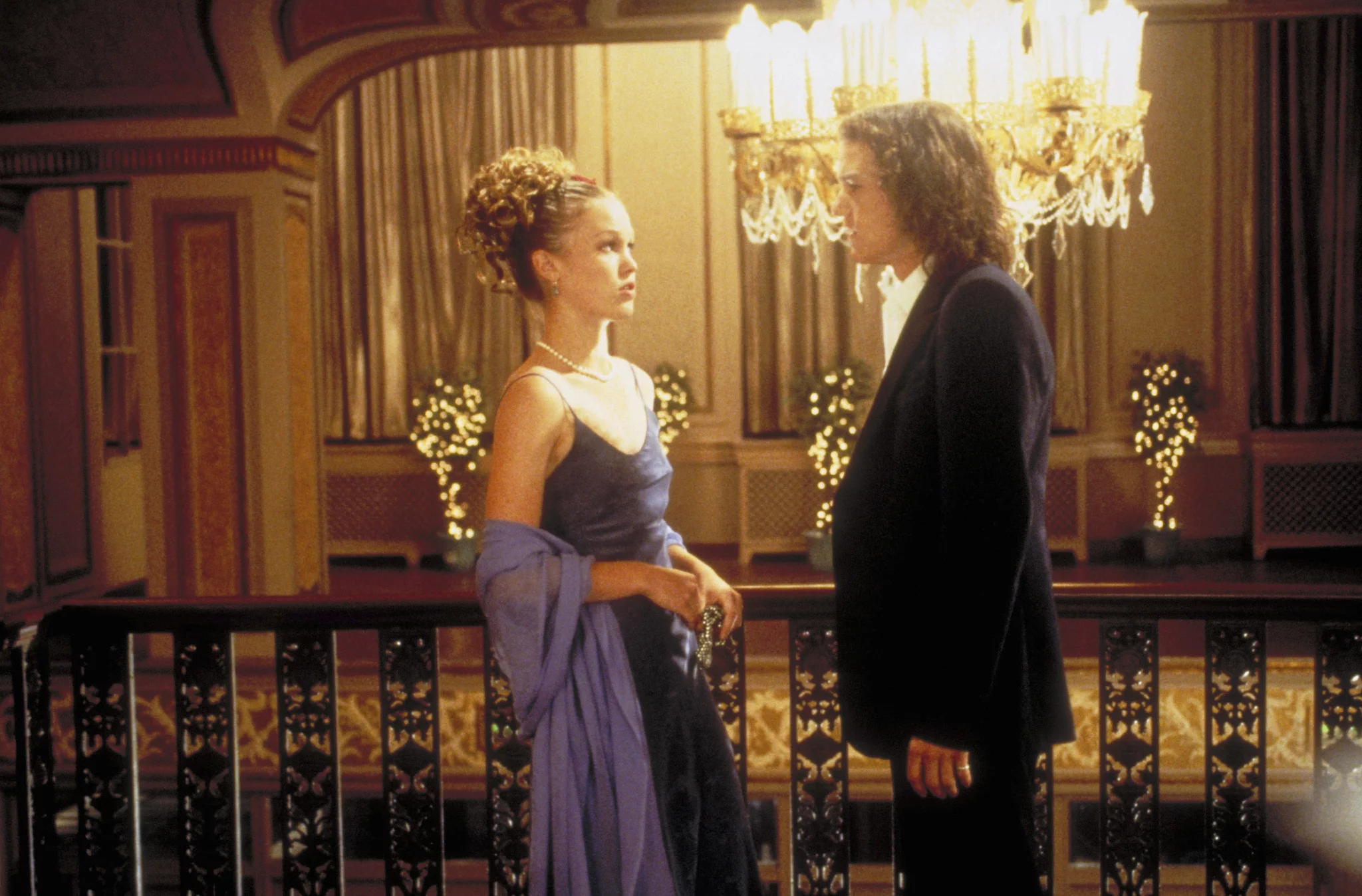
Cultural Impact and Critical Reception: “10 Things I Hate About You” resonated with audiences worldwide, capturing the essence of late ’90s youth culture. Its success can be attributed to its witty dialogue, engaging plot, and the chemistry between its leads. The film received critical acclaim for its modern take on Shakespeare, making it accessible and relevant to a contemporary audience.
Heath Ledger’s performance, in particular, was lauded for its charm and depth. Critics and viewers alike praised his ability to convey a wide range of emotions, from comedic timing to moments of sincere vulnerability. Ledger’s portrayal of Patrick Verona contributed significantly to the film’s appeal, establishing it as a milestone in teen cinema and heralding the arrival of a significant new talent in Hollywood.
Comparisons and Actor’s Evolution: While “10 Things I Hate About You” offered Ledger a less complex role compared to his later work, it was instrumental in showcasing his potential as an actor. The film highlighted his natural screen presence and his skill in elevating the material with his performance. Ledger’s portrayal of Patrick Verona demonstrated his proficiency in blending comedy with depth, a trait that would become a hallmark of his career.
This role served as an early testament to Ledger’s versatility, foreshadowing the range of characters he would adeptly embody in the future. From the enigmatic Joker in “The Dark Knight” to the introspective Ennis Del Mar in “Brokeback Mountain,” Ledger’s subsequent roles reflected an actor unafraid to explore the complexities of the human condition. “10 Things I Hate About You” stands as a pivotal point in Ledger’s evolution, highlighting his ability to navigate both comedic and dramatic roles with equal finesse.

“10 Things I Hate About You” remains a cherished film within the teen genre, thanks in large part to Heath Ledger’s standout performance. As Patrick Verona, Ledger delivered a character that transcended the typical teen movie archetype, offering depth, humor, and a tangible sense of humanity.
This role not only marked the beginning of Ledger’s Hollywood journey but also set the stage for his development into one of the most compelling actors of his generation. Through “10 Things I Hate About You,” Ledger demonstrated versatility and talent that would define his career, leaving an indelible mark on cinema and establishing a legacy that continues to inspire.
4. “A Knight’s Tale” (2001)
“A Knight’s Tale” (2001), directed by Brian Helgeland, stands out as a unique and vibrant reimagining of the medieval jousting genre, largely due to Heath Ledger’s captivating portrayal of William Thatcher. Ledger’s role as the ambitious peasant who masquerades as a knight not only showcased his versatility as an actor but also cemented his status as a leading man in Hollywood. Through a blend of charm, determination, and emotional depth, Ledger brought the character of William to life, creating a story that was both entertaining and inspirational.
Plot and Character Development: The narrative of “A Knight’s Tale” is driven by William Thatcher’s quest to redefine his destiny. Born a peasant, William seizes an unlikely opportunity to change his social standing by assuming the identity of a knight. Ledger’s portrayal of William is a compelling journey of self-discovery, ambition, and love.
He imbues the character with a relatable humanity, making his dreams and desires resonate with the audience. Ledger’s performance expertly balances the comedic and dramatic elements of the story, depicting William’s transformation from an underdog to a champion. His ability to convey determination and vulnerability in equal measure makes the character’s journey from peasant to knight both believable and deeply moving.
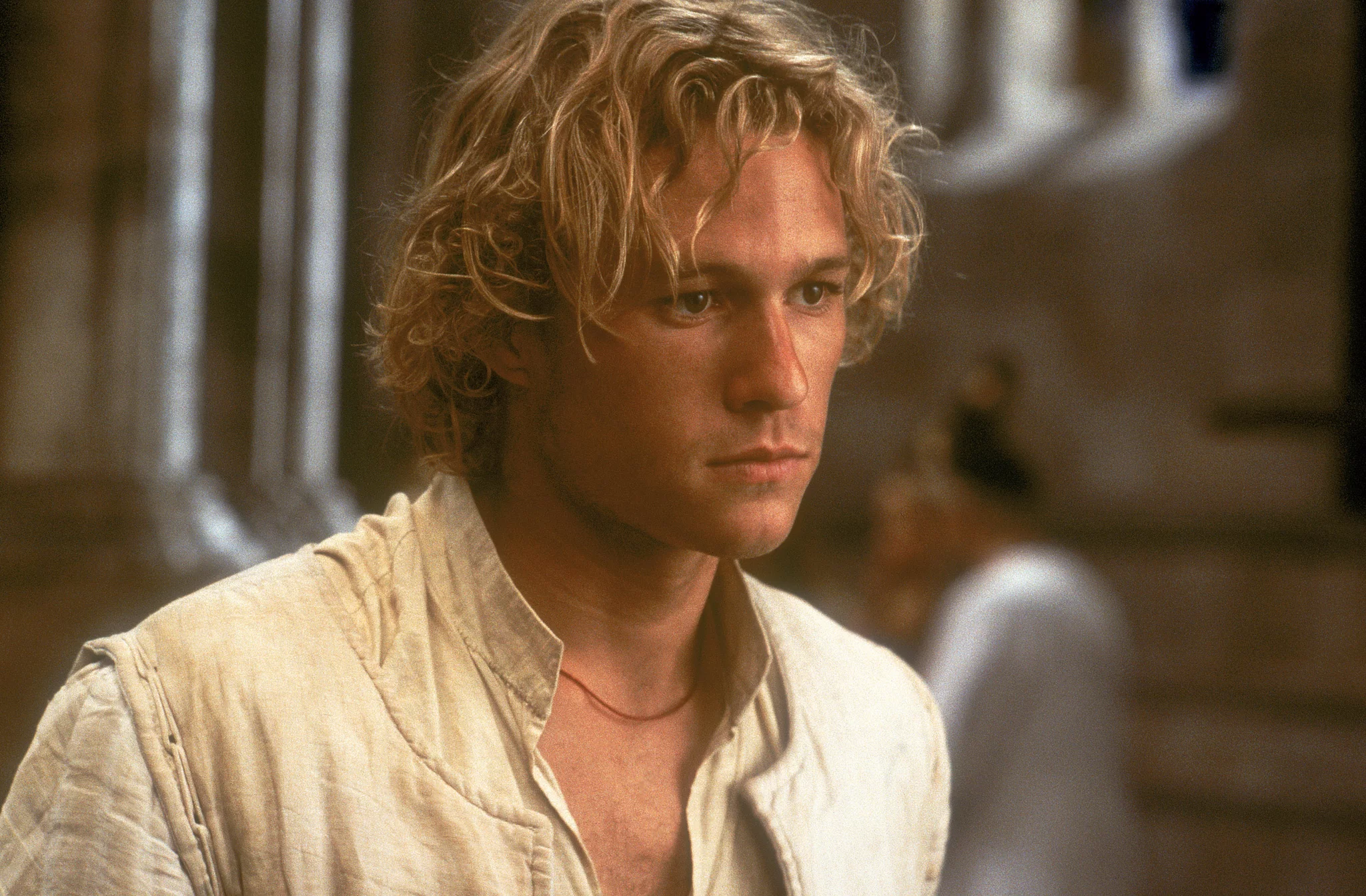
Cultural Impact and Critical Reception: “A Knight’s Tale” was notable for its anachronistic approach, blending modern music with a medieval setting, thereby offering a fresh and engaging take on the genre. The film’s soundtrack, featuring contemporary rock songs, played a key role in its appeal, attracting a younger audience and giving the historical setting a modern sensibility.
Ledger’s performance was central to the film’s success, earning praise for his charismatic portrayal of William Thatcher. Critics and audiences alike lauded the film for its humor, heart, and innovative storytelling, with Ledger’s leading role highlighted as a testament to his burgeoning talent and on-screen presence.
Comparisons and Actor’s Evolution: The role of William Thatcher in “A Knight’s Tale” marked a significant evolution in Ledger’s career, showcasing his ability to lead a major motion picture. This film bridged the gap between his earlier work in teen comedies like “10 Things I Hate About You” and the more complex, dramatic roles he would later embrace.
“A Knight’s Tale” demonstrated Ledger’s range as an actor, highlighting his capacity for both light-hearted humor and serious drama. His performance in this film illustrated his growth as an artist, capable of carrying a film with both his physical presence and emotional depth. It served as a pivotal moment in Ledger’s career, proving that he was not just a teen idol but a versatile actor with the potential to take on a variety of challenging roles.

“A Knight’s Tale” remains a memorable entry in Heath Ledger’s filmography, not only for its creative storytelling and engaging performances but also for its role in showcasing Ledger’s talents to a broader audience. His portrayal of William Thatcher is a celebration of the actor’s ability to connect with viewers, blending humor, romance, and action to create a truly compelling cinematic experience.
This film, with its unique blend of elements, serves as a reminder of Ledger’s multifaceted talent and his enduring impact on the world of film. Through “A Knight’s Tale,” Ledger left an indelible mark on the medieval genre, offering a timeless story of courage, love, and the pursuit of one’s dreams.
5. “Monster’s Ball” (2001)
In the critically acclaimed drama “Monster’s Ball” (2001), Heath Ledger took on the role of Sonny Grotowski, a young prison guard caught in the turbulent wake of his family’s legacy of racism and hatred. Despite his limited screen time, Ledger’s portrayal of Sonny remains a pivotal and unforgettable aspect of the film, highlighting his capacity for deep emotional resonance and complex character portrayal.
Directed by Marc Forster, “Monster’s Ball” is a haunting exploration of race, redemption, and the possibility of finding love amid despair, themes that are significantly enhanced by Ledger’s nuanced performance.
Plot and Character Development: Sonny Grotowski is introduced as a character tormented by the weight of his father’s prejudices and his own moral uncertainties. Living under the shadow of his racist father Hank (played by Billy Bob Thornton), Sonny struggles with the legacy of hatred he inherits and seeks redemption in a world that seems to offer little forgiveness.
Ledger’s portrayal of Sonny is marked by a profound vulnerability and a palpable sense of inner turmoil. Through his performance, Ledger effectively communicates the complexity of Sonny’s struggle, making his desire for change and redemption deeply relatable. The character’s journey is a testament to Ledger’s ability to delve into the psyche of his roles, offering viewers a glimpse into the soul of a man caught between the forces of darkness and light within himself.
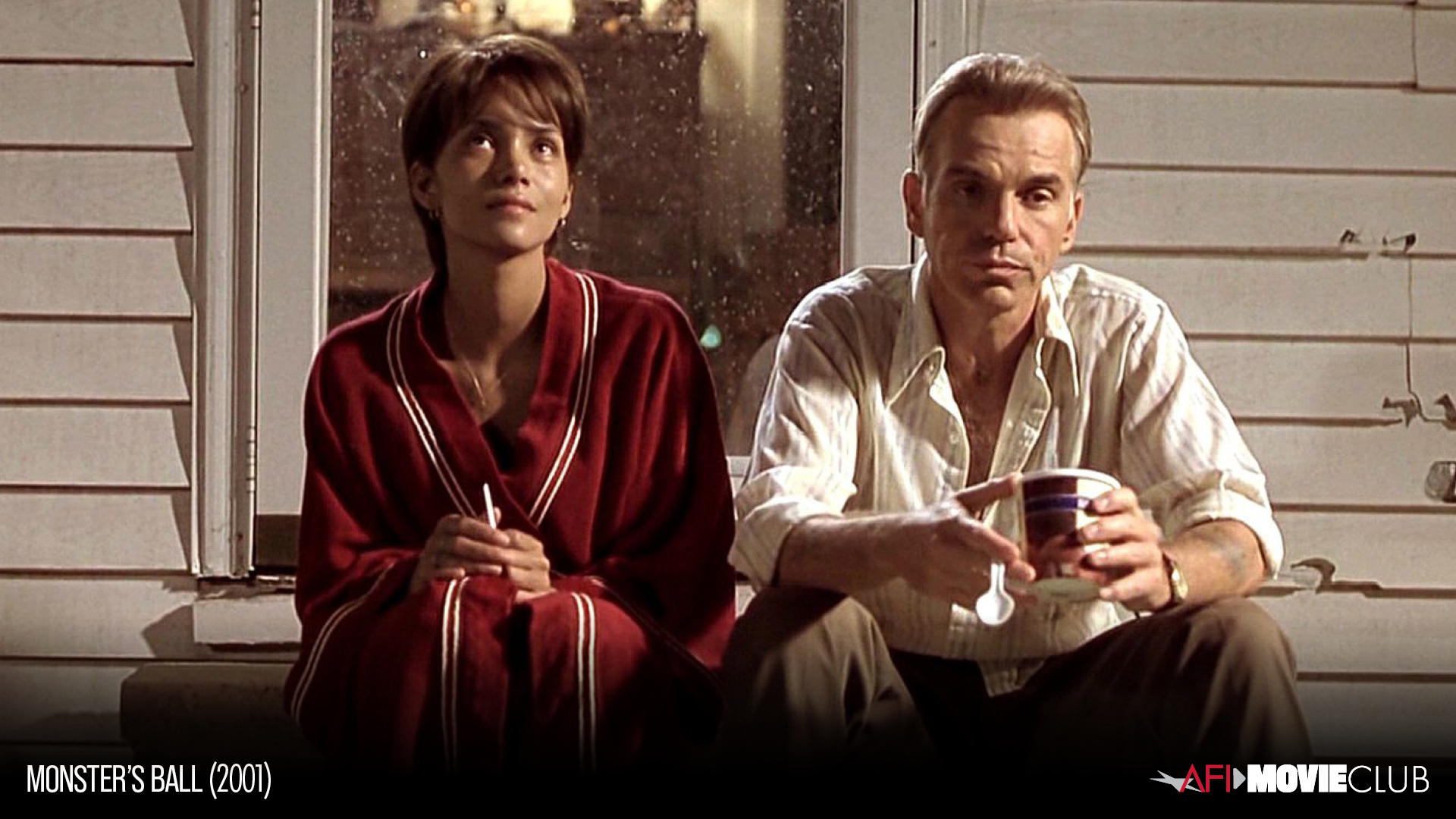
Cultural Impact and Critical Reception: “Monster’s Ball” was lauded for its unflinching portrayal of difficult themes, earning acclaim for its direction, screenplay, and performances, especially Halle Berry’s Oscar-winning role. The film’s exploration of racism, loss, and the human capacity for change resonated strongly with audiences and critics alike.
Ledger’s performance, although in a supporting capacity, was highlighted for its intensity and the emotional depth he brought to the character of Sonny. Critics noted how Ledger’s portrayal added a crucial layer to the film’s examination of familial and societal dysfunction. His ability to convey Sonny’s conflicted nature contributed significantly to the movie’s impact, reinforcing its themes of redemption and the possibility of transcendence beyond hate.
Comparisons and Actor’s Evolution: “Monster’s Ball” occupies a special place in Heath Ledger’s filmography, showcasing his willingness to embrace challenging and emotionally charged roles. This film represented a departure from the more lighthearted characters Ledger had portrayed earlier in his career, signaling his evolution as an actor capable of navigating the complexities of the human condition.
The role of Sonny Grotowski allowed Ledger to explore themes of redemption and moral ambiguity, setting the stage for the complex characters he would later embody. His performance in “Monster’s Ball” reflects his growth as an artist and his commitment to roles that delve into darker aspects of life, highlighting his versatility and depth as an actor.

Throughout his career, Heath Ledger consistently chose projects that challenged him artistically and allowed him to push the boundaries of his craft. From his charismatic turn in “A Knight’s Tale” to his haunting portrayal of the Joker in “The Dark Knight,” Ledger demonstrated an extraordinary range and a profound understanding of the characters he brought to life. “Monster’s Ball,” with its complex exploration of redemption and humanity, was an important milestone in Ledger’s journey as an actor, affirming his ability to tackle roles of significant emotional and thematic depth.
Through his performance as Sonny Grotowski, Ledger left an indelible mark on cinema, showcasing his unparalleled talent and his fearless approach to acting. His legacy continues to inspire both audiences and actors, serving as a testament to his enduring impact on the world of film.
6. “Casanova” (2005)
In the 2005 film “Casanova,” Heath Ledger ventured into the realm of historical comedy, taking on the role of the legendary lothario Giacomo Casanova. Directed by Lasse Hallström, this film offers a vibrant, if somewhat fictionalized, portrayal of the life of one of history’s most notorious figures. Ledger’s Casanova is not just a mere seducer; he is depicted as a man of depth, wit, and a surprising vulnerability, traits that Ledger masterfully brings to the forefront of his performance.
Through this role, Ledger demonstrated his versatility as an actor, adeptly handling comedy while infusing his character with layers of complexity and humanity.
Plot and Character Development: “Casanova” presents a somewhat embellished narrative of Giacomo Casanova’s life, focusing on his amorous adventures in Venice. In the film, Casanova is depicted at a crossroads, challenged not only by the authorities who seek to arrest him for his licentious behavior but also by his own heart as he pursues a love that defies his legendary reputation.
Ledger’s portrayal adds a multi-dimensional quality to Casanova, highlighting his intelligence, charm, and the existential dilemma of a man known more for his conquests than for his personhood. Ledger skillfully navigates the fine line between the character’s public persona and his private yearnings, offering a portrayal that is both entertaining and thought-provoking.

Cultural Impact and Critical Reception: Though “Casanova” garnered mixed reviews, it provided an engaging look at 18th-century Venetian society, replete with its opulence, political intrigue, and social mores. Ledger’s performance, in particular, received accolades for bringing sincerity and depth to a character that could easily have been portrayed as a mere caricature.
Critics and audiences alike appreciated Ledger’s ability to convey Casanova’s wit and vulnerability, elements that added a fresh perspective to the historical figure. The film’s reception highlighted the challenges of balancing historical accuracy with entertainment, a task that Ledger’s nuanced performance helped to mitigate by offering a humanized portrayal of the legendary seducer.
Comparisons and Actor’s Evolution: Coming on the heels of his critically acclaimed performance in “Brokeback Mountain,” “Casanova” showcased a different facet of Ledger’s talent. This role demonstrated his capacity to transition between genres and characters seamlessly, underscoring his versatility and breadth as an actor. Unlike the intense and brooding roles for which he had become known, Casanova allowed Ledger to explore a lighter, more comedic side of his acting repertoire.
Yet, even within this lighter context, Ledger imbued his character with a complexity and depth that spoke to his skills as an actor. This film stands as a testament to Ledger’s range and his ability to inhabit vastly different characters, from the tortured soul of Ennis Del Mar to the flamboyant and charismatic Giacomo Casanova.

“Casanova” remains an important work within Heath Ledger’s filmography, highlighting his adaptability and commitment to exploring the nuances of his characters. Ledger’s portrayal of Casanova contributed to a rich and varied career that spanned genres and showcased an extraordinary talent for bringing depth and humanity to his roles.
Through this film, Ledger demonstrated that his capabilities as an actor were not confined to any single genre or character type but were instead characterized by a willingness to embrace and embody the complexities of the human experience. His performance in “Casanova” further cemented his legacy as one of the most versatile actors of his generation, capable of leaving an indelible mark on each role he undertook.
7. “The Imaginarium of Doctor Parnassus” (2009)
“The Imaginarium of Doctor Parnassus,” directed by Terry Gilliam, stands as a poignant footnote in the career of Heath Ledger, marking his final film role before his untimely death. In this fantastical adventure, Ledger plays Tony, a mysterious man who becomes entangled with a traveling theater troupe led by the immortal Doctor Parnassus.
The film, with its labyrinthine plot and visually stunning landscapes, serves as a canvas for Ledger’s immense talent, showcasing his ability to navigate a complex narrative with ease and finesse. Through Tony, Ledger offers a performance that is both captivating and enigmatic, leaving audiences with a lasting impression of his versatile acting prowess.
Plot and Character Development: “The Imaginarium of Doctor Parnassus” is a tale of magic, morality, and the power of storytelling. Ledger’s character, Tony, is introduced as a charismatic yet mysterious figure whose arrival marks a turning point for the troupe. Tony’s complexity as a character lies in his ambiguous morality and the secrets he harbors, aspects that Ledger portrays with a compelling depth.
Throughout the film, Tony’s interactions with the troupe and his journey through the fantastical realms of Doctor Parnassus’s mirror reveal not only his character’s layers but also his influence on the story’s unfolding. Ledger’s ability to imbue Tony with a mix of charm and mystery makes him a fascinating protagonist, driving the narrative forward and engaging the audience with each twist and turn.
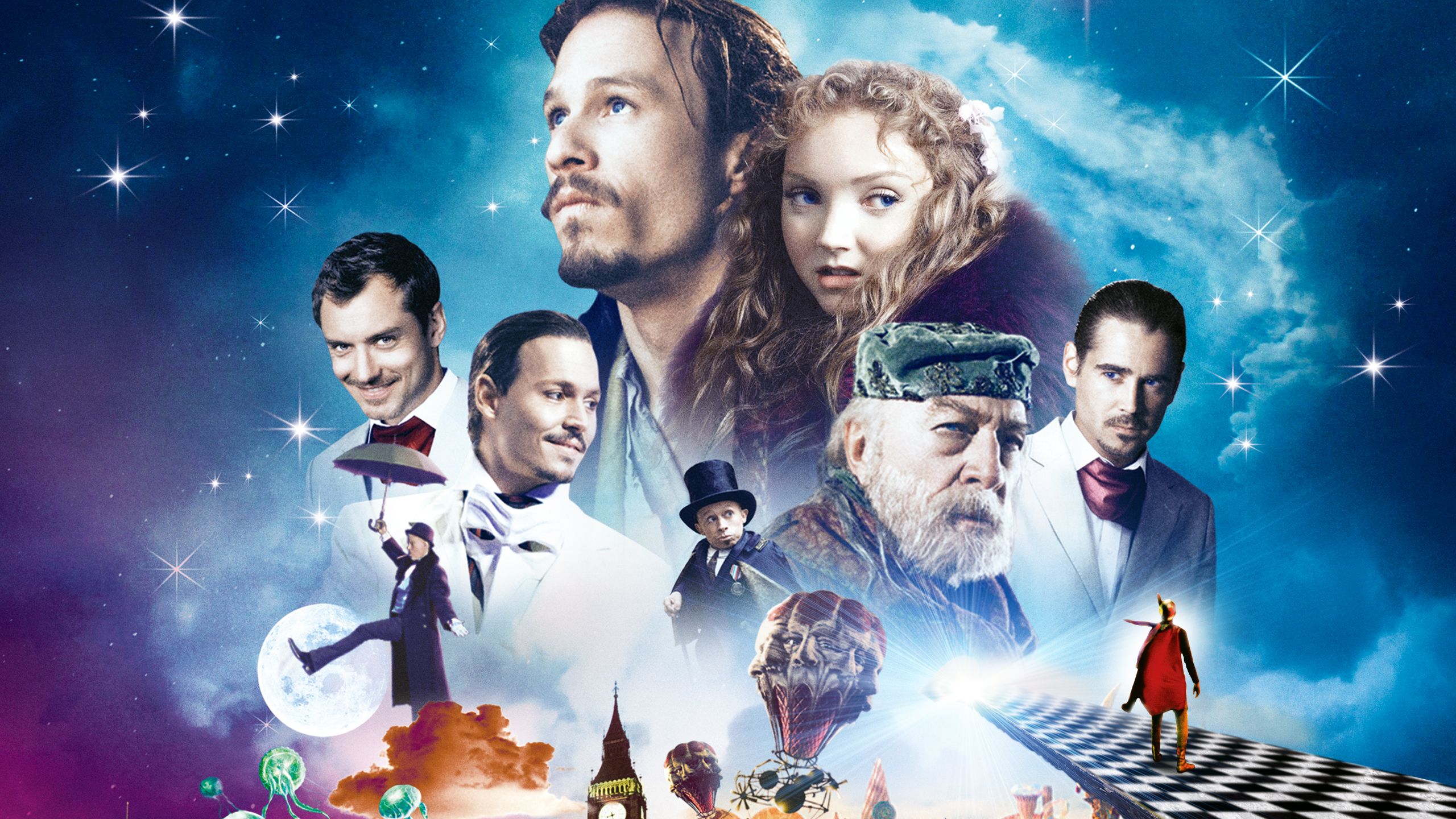
Cultural Impact and Critical Reception: Released posthumously, Ledger’s performance in “The Imaginarium of Doctor Parnassus” was met with a sense of bittersweet admiration. The film itself garnered mixed reviews, with critics praising its imaginative vision but noting its sometimes convoluted plot.
However, Ledger’s work was universally acclaimed, with many highlighting his role as a testament to his fearless and inventive approach to acting. His portrayal of Tony resonated with audiences and critics alike, serving as a powerful reminder of the talent lost. The film, beyond its narrative complexities, stands as a tribute to Ledger’s artistry, encapsulating his ability to breathe life into every character he portrayed.
Comparisons and Actor’s Evolution: “The Imaginarium of Doctor Parnassus” showcases the culmination of Ledger’s growth as an actor, from his early roles to his final, unfinished performance. This film illustrates his journey from a promising talent in films like “10 Things I Hate About You” to an actor capable of undertaking challenging and unconventional roles, as evidenced by his portrayal of the Joker in “The Dark Knight.”
Through Tony, Ledger demonstrates his willingness to explore the depths of complex characters, pushing the boundaries of traditional storytelling. His performance is a testament to his artistic evolution, highlighting his ability to infuse each role with a unique blend of intensity and nuance.

Heath Ledger’s portrayal of Tony in “The Imaginarium of Doctor Parnassus” remains a poignant reflection of his extraordinary talent and his commitment to his craft. The film, while marking the end of his career, also serves as a lasting legacy of his ability to challenge, captivate, and inspire. Through his work in this final role, Ledger left an indelible mark on the world of cinema, demonstrating the profound impact that a truly gifted actor can have on the storytelling landscape.
His performance in “The Imaginarium of Doctor Parnassus” is not just a farewell; it is a celebration of Ledger’s enduring influence as an actor whose talents knew no bounds, whose presence on screen continues to enchant and whose artistry will be remembered for generations to come.
8. “I’m Not There” (2007)
“I’m Not There” (2007), directed by Todd Haynes, is a groundbreaking exploration into the life and persona of the iconic musician Bob Dylan. The film is distinguished by its unconventional structure, using six different actors to portray various aspects of Dylan’s complex character.
Among these portrayals, Heath Ledger’s contribution stands out as a deeply nuanced interpretation of Dylan’s life, particularly focusing on the musician’s turbulent relationship with his wife and the ensuing personal and artistic crisis. Ledger’s performance delves into the intricacies of love, fame, and identity, showcasing his remarkable ability to embody the spirit of one of music’s most enigmatic figures.
Plot and Character Development: In “I’m Not There,” Ledger plays a version of Bob Dylan named Robbie Clark, a successful actor whose life mirrors Dylan’s own experiences with fame, creativity, and personal turmoil. This segment of the film explores the challenges Dylan faced in balancing his public persona with his private life, particularly focusing on the strain that fame exerted on his marriage.
Ledger’s portrayal captures the inner conflict of a man torn between his art and his personal happiness, offering a window into Dylan’s soul. His performance is characterized by a palpable sense of vulnerability and introspection, portraying Dylan not as a mythical figure but as a deeply flawed and relatable human being.
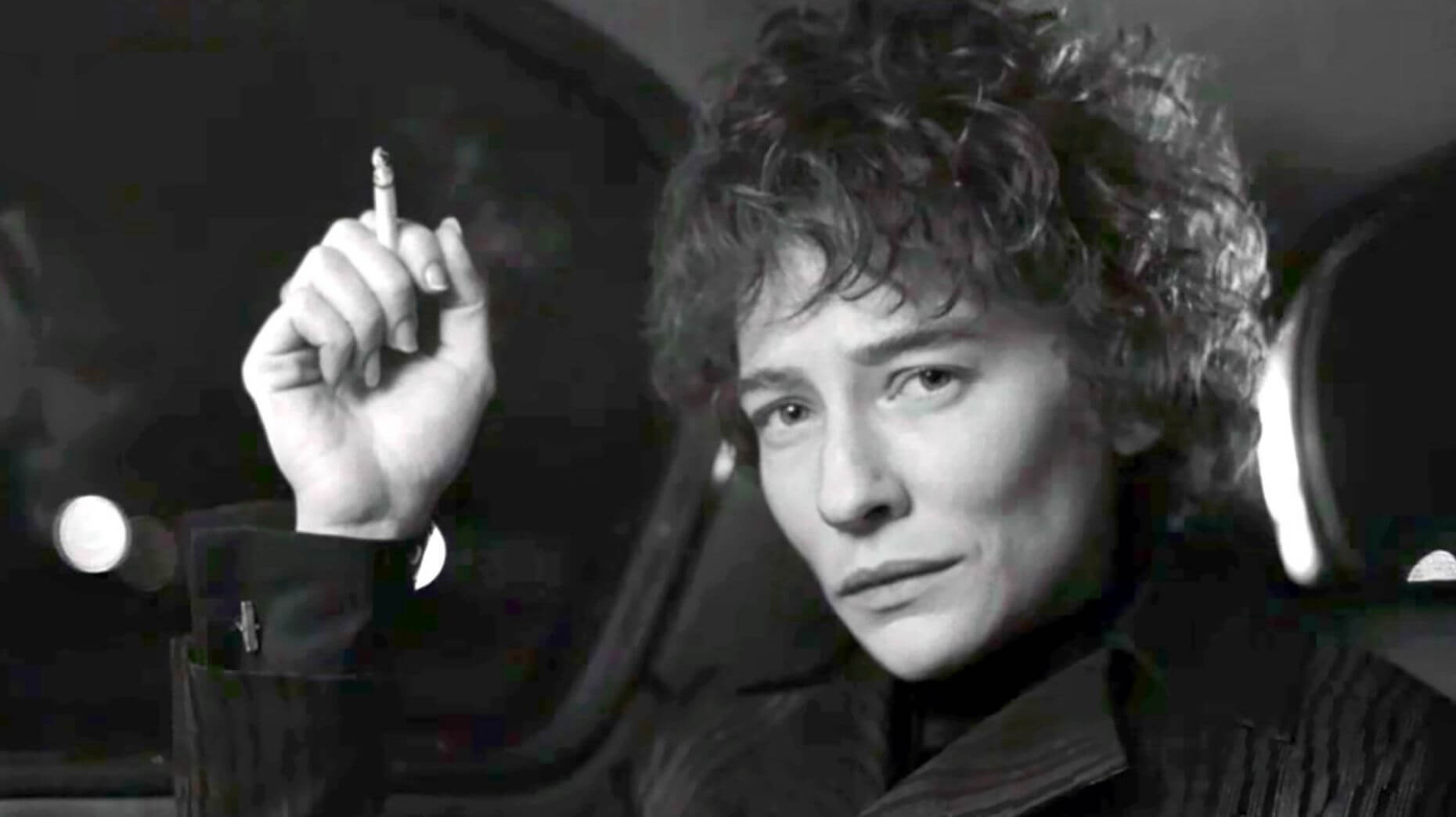
Cultural Impact and Critical Reception: “I’m Not There” was celebrated for its inventive narrative technique and its bold reimagining of the biographical genre. The film’s critical success was due in no small part to the strength of its performances, with Ledger’s portrayal receiving widespread acclaim. Critics lauded his ability to navigate the emotional complexities of Dylan’s character, emphasizing the depth and authenticity Ledger brought to the role.
His performance was seen as a key component of the film’s exploration of identity and transformation, contributing significantly to its impact as a cultural artifact.
Comparisons and Actor’s Evolution: Ledger’s role in “I’m Not There” epitomizes the adventurous spirit that defined his career. This performance, coming after his iconic role as the Joker in “The Dark Knight,” demonstrates his extraordinary range and his fearless approach to acting. Ledger’s choice to participate in such an experimental project highlights his dedication to challenging conventional narratives and his desire to engage with complex, multifaceted characters.
Through Robbie Clark, Ledger explored themes of fame, creativity, and personal struggle, elements that resonate throughout his body of work. This role not only showcased his capacity for emotional depth but also affirmed his status as one of his generation’s most talented and versatile actors.

Heath Ledger’s portrayal in “I’m Not There” serves as a testament to his exceptional talent and his unwavering commitment to the art of acting. By embracing the contradictions and complexities of Bob Dylan’s persona, Ledger added a profound emotional layer to the film, enriching its narrative and deepening its exploration of identity.
His performance in “I’m Not There” stands as a highlight in a career marked by bold choices and remarkable versatility, further cementing his legacy as an actor capable of bringing depth and nuance to even the most challenging roles. Through his work in this film and others, Ledger demonstrated an extraordinary ability to connect with audiences on a deeply human level, leaving behind a body of work that continues to inspire and move viewers around the world.
9. “Lords of Dogtown” (2005)
“Lords of Dogtown” (2005), directed by Catherine Hardwicke, captures the raw essence and transformative spirit of 1970s skateboard culture in Venice Beach, Los Angeles. At the heart of this narrative is Heath Ledger’s portrayal of Skip Engblom, the real-life co-founder of the Zephyr Skateboard Team, whose unconventional methods and mentorship played a pivotal role in the lives of the young skateboarders he took under his wing.
Ledger’s performance is a masterful embodiment of the era’s rebellious ethos, delivering a character study that is as complex and nuanced as it is compelling.
Plot and Character Development: The film chronicles the rise of the Zephyr Skateboard Team, a group of disaffected teens who revolutionized skateboarding with their aggressive style and street-smart attitude. Ledger’s Skip Engblom is portrayed as the eccentric yet visionary mentor whose guidance is crucial to their success.
However, the film also delves into the complexities of Skip’s character, exploring his struggles with business pressures, his volatile personality, and his deep affection for his protégés. Ledger’s transformative performance brings to life Skip’s wild energy and charisma, capturing the essence of a man whose passion for skateboarding and loyalty to his team are matched only by his personal demons and flaws.
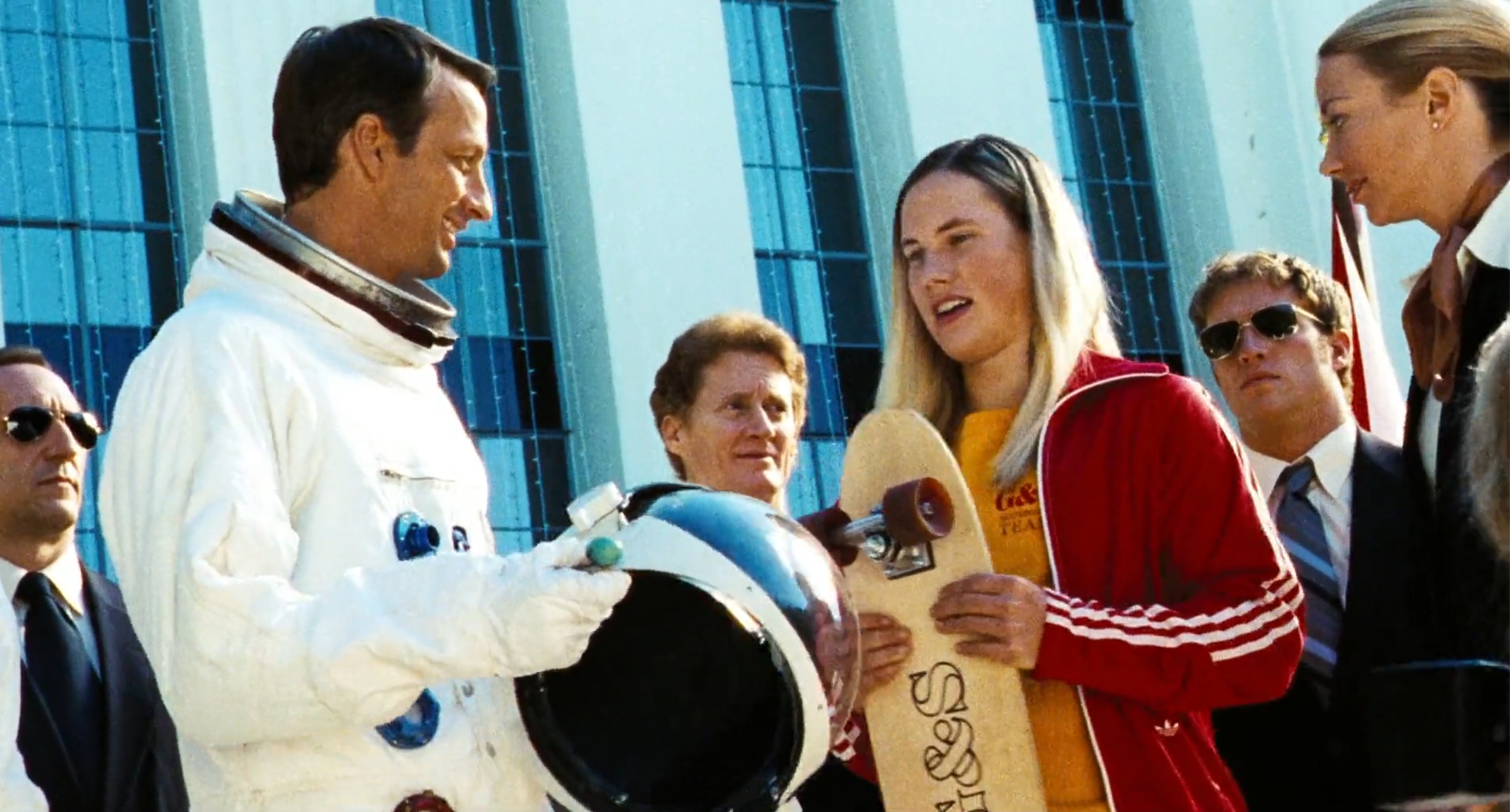
Cultural Impact and Critical Reception: “Lords of Dogtown” pays homage to a pivotal moment in skateboarding history, celebrating the sport’s evolution from a fringe activity to a global phenomenon. The film’s cultural significance is underscored by Ledger’s portrayal of Skip Engblom, which received widespread acclaim for its authenticity and depth. Critics and audiences alike praised Ledger for his ability to fully immerse himself in the role, highlighting his performance as a testament to his skill in character transformation.
The film, while a dramatized account, offers a gritty, realistic portrayal of the skateboarding subculture of the 1970s, with Ledger’s performance standing out as a vivid reminder of the era’s impact on popular culture.
Comparisons and Actor’s Evolution: Ledger’s role in “Lords of Dogtown” is emblematic of his extraordinary range as an actor. This performance, coming after his breakthrough in “Brokeback Mountain,” showcases his versatility and willingness to tackle diverse characters across genres. Skip Engblom, with his flamboyant style and complex personality, is a departure from the more introspective roles Ledger had previously undertaken.
Yet, Ledger’s portrayal is imbued with the same depth and commitment seen in his other work, demonstrating his ability to inhabit characters fully. “Lords of Dogtown” highlights Ledger’s talent for capturing the essence of real-life figures, adding a layer of authenticity and emotional resonance to the film.

Through his role as Skip Engblom, Heath Ledger not only paid tribute to a legendary figure in the skateboarding world but also left an indelible mark on the portrayal of mentorship and rebellion in cinema. His performance in “Lords of Dogtown” exemplifies the depth of his artistic vision, showcasing his capacity to bring complexity and humanity to larger-than-life characters.
Ledger’s work in this film is a testament to his ongoing evolution as an actor, reflecting his dedication to exploring the human condition through a diverse range of roles. As “Lords of Dogtown” continues to resonate with audiences, Heath Ledger’s portrayal of Skip Engblom stands as a powerful tribute to the transformative power of mentorship and the enduring legacy of the skateboarding culture.
10. “Ned Kelly” (2003)
“Ned Kelly” (2003), directed by Gregor Jordan, offers a gritty and compelling portrayal of one of Australia’s most infamous figures, with Heath Ledger delivering a riveting performance as the titular character.
This film delves into the life of Ned Kelly, an outlaw and folk hero who led a band of bushrangers in a rebellion against the British colonial authority in the late 19th century. Ledger’s portrayal of Kelly is marked by an intense and brooding presence, capturing the complexity of a man driven to extremes in his fight against oppression. Through this role, Ledger not only explores the depths of Kelly’s desperation and defiance but also brings to life the spirit of rebellion that Kelly represents.
Plot and Character Development: The narrative of “Ned Kelly” is centered around the true story of Kelly’s life – from his early encounters with the law to his eventual descent into outlawry and his leadership of the Kelly Gang. Ledger’s performance encapsulates Kelly’s transformation, portraying the range of emotions that define his character, from his initial reluctance to break the law to his resolve to stand against injustice.
Ledger adeptly navigates Kelly’s evolution, presenting a multifaceted character whose actions are driven by a mix of personal vendettas, a sense of injustice, and a deep love for his family and community. Through Ledger’s portrayal, Ned Kelly emerges as a complex figure, both heroic and tragic, embodying the tensions between rebellion and righteousness.
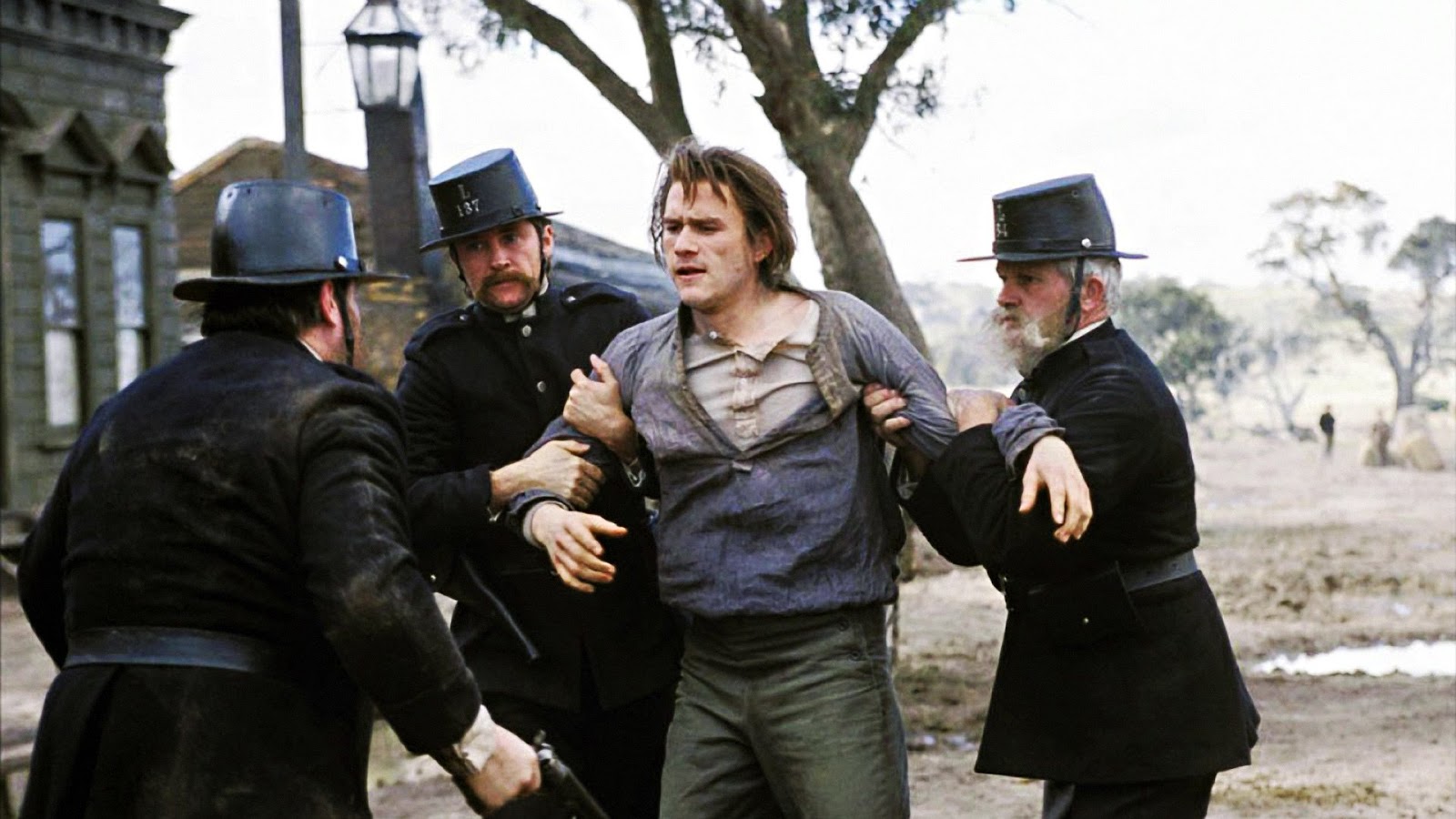
Cultural Impact and Critical Reception: “Ned Kelly” played a significant role in the mythologization of its protagonist, contributing to the legend surrounding the historical figure. The film sparked discussions about Australian identity, the legacy of colonialism, and the nature of heroism and villainy. Ledger’s performance was central to the film’s impact, earning praise for bringing humanity and depth to a character often simplified as a mere criminal or folk hero.
Critics highlighted Ledger’s dynamic presence and the authenticity he brought to the role, underscoring his talent in leading historical dramas and portraying complex characters. The film’s reception underscored Ledger’s capacity to engage audiences with nuanced portrayals of historical figures, further establishing his reputation as a versatile and skilled actor.
Comparisons and Actor’s Evolution: “Ned Kelly” stands as a testament to Heath Ledger’s remarkable range as an actor. This role, which required Ledger to embody the spirit of one of Australia’s most iconic figures, showcases his ability to delve deeply into complex characters and historical narratives.
Coming after roles in films such as “The Patriot” and preceding his performances in “Brokeback Mountain” and “The Dark Knight,” “Ned Kelly” highlights Ledger’s evolution from a promising actor to a formidable talent capable of carrying a film on his shoulders. Through his portrayal of Ned Kelly, Ledger demonstrated a profound understanding of character development and historical context, qualities that would define his approach to later roles.

Heath Ledger’s performance in “Ned Kelly” is a powerful illustration of his talent for bringing historical figures to life on the big screen. Through his portrayal of Kelly, Ledger not only contributed to the legend of the Australian outlaw but also left an indelible mark on the portrayal of historical figures in cinema.
His work in this film exemplifies the depth and versatility of his acting, showcasing his ability to infuse iconic characters with a sense of humanity and complexity. As “Ned Kelly” continues to captivate audiences, Ledger’s portrayal remains a poignant reminder of his legacy as an actor who fearlessly embraced challenging roles, offering audiences a window into the lives of complex and conflicted characters.
Heath Ledger’s body of work is a testament to his talent, versatility, and dedication to his craft. From romantic comedies to dark dramas and fantastical tales, Ledger consistently delivered performances that were not only captivating but also deeply human. His roles in these top 10 movies reflect not just his evolution as an actor but also his impact on cinema and culture at large.
As we reflect on Heath Ledger’s legacy, it’s clear that his influence extends beyond the characters he portrayed. His commitment to exploring the depths of the human experience, coupled with his remarkable ability to transform into his characters, has left an indelible mark on the film industry. Heath Ledger will always be remembered as an actor who brought intensity, nuance, and authenticity to every role he undertook, leaving behind a legacy that continues to inspire actors and filmmakers alike.
Through his performances, Ledger challenged audiences to see the world through different lenses, making his work not just entertainment but a powerful form of art. As we look back on his career, it’s evident that Heath Ledger was not just a talented actor; he was a visionary who pushed the boundaries of acting, leaving a legacy that will be cherished and studied for generations to come.









